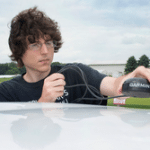2018 Conference
2018 National Energy Conference: 12/1
The 2018 “Climate Issues Update” National Energy Conference was a big success! Scroll down to see information on principal speakers and topics. Click the link below to see all of the conference media coverage, speaker Powerpoint presentations, videos, and more.
CONFERENCE SPEAKERS

KEYNOTE SPEAKER: Emily Calandrelli
Emily Calandrelli, a Morgantown WV native who uses the professional nickname “The Space Gal,” has a B.S. in Mechanical and Aerospace Engineering from West Virginia University, and a Masters’ degree in Aeronautics and Astronautics and in Technology and Policy from Massachusetts Institute of Technology.
Emily is an Emmy-nominated science TV host, featured as a correspondent on “Bill Nye Saves the World,” and an Executive Producer and host of FOX’s “Xploration Outer Space,” which airs in 100 million households each week. She is an inspiring speaker on the need for science-driven education and policy to meet the challenge of climate change.

AMY HESSL
Geographer and Paleoclimatologist at WVU

BRANDI GAERTNER
Doctoral candidate in hydrology at WVU and faculty at Alderson Broaddus University

ANN CHESTER
Director, WVU Health Sciences and Technology Academy

ANDREW WILLIAMS
Environmental Defense Fund Director of Regulatory and Legislative Affairs, Climate and Energy

JOSHUA FERSHEE
Professor and Associate Dean, WVU College of Law, Center for Energy and Sustainable Development

ZACHARY BARKLEY
Methane Researcher, Penn State University

KENNETH DAVIS
Professor of Atmospheric Science, Penn State University

KURT WALTZER
Managing Director, Clean Air Task Force

TINA CARTWRIGHT
Associate Professor at Marshall University and Science Specialist with Cabell County Schools

JIM PROBST
Small business owner, State Coordinator, Citizen’s Climate Lobby

EVAN HANSEN
President, Downstream Strategies

DYLAN SELTERMAN
Professor of Psychology, University of Maryland

JOSH MURPHY
Research Assistant, Center for Climate Change Communications

AUTUMN LONG
WV Program Director, Solar United Neighbors

DEREK JOHNSON
Research Assistant Professor of Engineering, WVU

OMAR AZIZ
Associate Professor of Engineering, WVU

THOMAS RODD
Project Director, Allegheny Highlands Climate Change Impact Initiative

LOGAN THORNE
Conference Coordinator
CONFERENCE TOPICS
Learn more about the latest research on these topics here.
Climate Change Communication
Families and communities want to talk honestly about their climate future. Students and teachers want to learn and teach about climate science and policy choices. Businesses want to encourage customers to make climate-friendly choices. Advocates want to build political support for climate solutions. Political leaders and constituents want to communicate about climate issues. Expert presenters and group discussion will examine what we know and don’t yet know about climate communication – and how we can discover and implement the knowledge we need.
CONTROLLING METHANE EMISSIONS
Experts agree on the importance of controlling atmospheric methane emissions from natural gas leakage. The World Resources Institute estimates that limiting methane leakage to one percent or less of total natural gas production will ensure that natural gas is less climate-intensive than substitutes such as coal, diesel fuel, and gasoline and can provide immediate and permanent climate benefits. Citizens, scientists, public agencies, and businesses must play an informed role in controlling natural gas emissions. Expert presenters and group discussion will address the technical, legal, financial, regulatory, and political aspects of this important issue.
PUTTING A PRICE ON CARBON
Bipartisan efforts recently enacted a substantial federal tax credit for carbon capture, utilization, and storage (“CCUS”) – creating a potentially transformative market-based financial incentive for technologies that reduce greenhouse gas emissions. Bipartisan groups are also supporting revenue-neutral carbon “fee and dividend” plans that would reduce carbon pollution and return the proceeds to citizens. Expert presenters and group discussion will address using financial incentives and market-based systems to reduce greenhouse gas emissions.
OBSTACLES AND OPPORTUNITIES FOR SOLAR POWER
Incentives and opportunities are growing for commercial-scale solar energy projects on former coal mining sites in Appalachia. Jobs, environmental reclamation, and reduced greenhouse gas emissions are the benefits – but what are the obstacles, and how can they be overcome? Experts will discuss how communities, political leaders, and regulators can seize this opportunity for the long-term benefit of the region and the climate.
